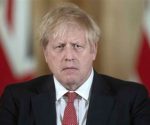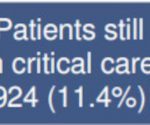As BBC admits licence fee refusal impacts its viability, with the end of over-75 subsidy, even more “evasion” ahead
In June the BBC released its Group Annual Report and Accounts 2018/19, and the headline information had to be a 3.7% decrease in income by licence fee revenue. While this was blamed on the phased reduction of government funding for licences for the over-75s, there was also a fall in the number of standard (colour) licences in force. Indeed, although the effect on the BBC of TV licence refusal is something that has been covered in instalments here at FBEL, this report is the first in which it has been noticed that the BBC is openly linking what it calls “evasion” to its ability to be financially viable. In a section titled, “Financial stability”, where there is a breakdown of conditions which would endanger such a thing, the following analysis appears:
There is a risk of a real time licence fee decline, a rise in licence fee evasion, or increased cost of collection potentially impacting our funding model, services and scope.
As such, the BBC appears to be acutely aware that it must be more dependent on commercial activities, and is cognisant of further risks that threaten its existence in terms of the pressures of the free market. For instance, as part of appreciating its own financial viability, the BBC understands the necessity for balancing expenditure on intellectual property and rights against the income that is consequently generated (or not). In its history, the BBC hasn’t had to worry about getting a return on its expenditure, but now it owns full control (at the cost of £180 million) of most of the UKTV platform – and it is a development that goes a good deal of the way to explaining the BBC’s concern about failing to “respond to market challenges” and even the risk of economic downturn which could adversely affect advertising revenue: something else that the BBC has never had to concern itself with. We also find that the BBC has turned its thoughts to its credit rating, presumably for purposes of borrowing as inexpensively as possible in order to fund output in order to make a profit.
Unfortunately for the BBC, it is an organisation that remains bloated as per the manner it has long since been accustomed to, so that in the context of funding its entire operation (orchestras and all), its current commercial capacity will only offer peanuts in comparison with its licence fee harvest – for 2018/19, all the BBC’s “other income” totalled £1,199 million, and that was down from £1,232 million. The BBC has a minor problem here too, because although it claims to be representative of the United Kingdom and its people, its buying out of UKTV – which basically shows “old TV” – is evidence that it recognises the draw, for commercial success, of what it would consider culturally outdated programming.
All things being equal, that the BBC now has to “give them what they want” more than it ever has in its past, it should understand that it cannot afford to be seen as politically motivated – a look that, in a proper country, should be hemlock to a successful business. However, all appearances suggest that the BBC is not culturally fit to create product in order to meet the sort of popular demand that is satiated by UKTV – no wonder, then, that the BBC is leaving the organisation to manage itself. And in fact, whether or not UKTV continues to be successful is irrelevant in as much as the takeover was really about securing maximum return on BBC intellectual property (i.e. the repeats). It is a loss-saving measure that won’t save the BBC.
Indeed, the BBC cannot sustain itself by its commercial enterprises, even when, as it happens, all things are not equal, and Britain is post-normal, so that television in general doesn’t have to attempt to reach an audience that is outside the State-generated consensus groupthink. Another way of putting this (because the author recently had a rare opportunity to look at an hour’s example) is that television is absolutely designed to be consumed by idiots. This is why many who are turning from owing a licence are not doing so out of a desire to improve themselves, nor from any suppressed sense of self-respect, but because they don’t need one to look at Netflix. As such, any rejection of the BBC in itself does not indicate that the kingdom of the blind is at last producing people with vision to appreciate, by first glance, that there is a fundamental problem.
And so it comes to pass that there is a bit of Orwell’s Ministry of Information in all of British media output, although the BBC is still the backbone of the British Government’s control grid. As such, all 17 million people who voted to leave the EU should be trying to kill the BBC off as an act of self-defence, but as just mentioned, people have largely been inculcated into stupidity. The death of the BBC, then, is by no means on the cards – although the Corporation is clearly not very confident about its future. And the problem is very much what the BBC calls “licence fee evasion”.
As far as the BBC is concerned, if there is an address that isn’t associated with a licence†, then the household is partaking in evasion. Consequently, when people cancel their licence because they no longer require one, and they inform the BBC as such, there is no final parting of the ways. Eventually, the BBC forgets that it has been given an excuse (although no such thing is due it) and the household is inevitably deemed to be an evader. The fundamental principle at work is that the BBC would assume that all households are watching TV; as such, not only is there no point communicating with the BBC/Capita to explain why there is no licence at a property, but there is also absolutely no compulsion to do it (please read the FBEL article, The TV Licensing Company – a shake down operation).
However it is presented, whether it comes as a migration to alternative ways to watch “television” or not, the bottom line for the BBC in 2018/19 was less licence fee sales, and this is going to set the tone in the future as the BBC considers its survival. Although the number of colour television licences in force fell from 21,611,000 in 2017/18 to 21,408,000, the BBC actually made £48 million more in revenue because of the increase in the licence fee price. While this is another little proof that Britons are mugs, it almost certainly promises to create greater resentment in certain otherwise law-abiding quarters as the BBC is seen to depend on fewer people who have to pay more. Ultimately, in 2018/19, total revenue from the licence fee fell from £3,830 million to £3,690, and the BBC blames the reduction of the Government subsidy for over-75 licences, which decreased from £655 million, to £468 million. While there is no denying the impact of the end of subsidisation, it serves as an easy excuse, and a disguise for a looming problem. Licences in force for the over-75s went up from 4,455,000 in 2017/18 to 4,603,000, but this is bad news, because it actually represents revenue that is almost certainly going to be lost to the BBC.
In a previous FBEL article, it was explained that…
There are essentially two things that the BBC can do to affect its ability to maintain a budget: increase the price of licences, and reduce existing and potentially new “evasion” – and do it in an efficient manner.
This analysis has partially been borne out by the BBC’s 2018/19 results: the impact of the decrease of colour television licence fees in force is mitigated by the rise in the price of the fee. However, as from next year, the BBC will be faced with a good portion of the 4,603,000 licences owned by over-75s reverting to cancellations, thereafter to be deemed as licences that are evaded. The BBC admitted in its report that “there was no appetite for the substantial cuts to BBC services that would have been necessary” if it had decided to continue to subsidise over-75 licences – and this pretty much encapsulates the size of the problem. As is turns out, the BBC has decided to subsidise a licence for households with an over-75 who is receiving pension credit – and calculates this as one being worth a third of the value of the Government subsidy. However, the BBC will have about 3 million newly-unsubsidised licences to enforce: here is the rather large scope for the potentially new evasion that is mentioned in the above extract.
While advocacy groups have been wielding sob stories about old age people being denied companionship if they are not allowed a free television licence, there is one thing that is being overlooked, which will be angst stemming from the BBC’s anxiety to secure revenue that, if it were left to go missing, would mean cuts in services:
One in four over-65s say the TV is their main form of companionship, according to Caroline Abrahams, charity director of Age UK.
She said: “Make no mistake, if this scheme goes ahead we are going to see sick and disabled people in their eighties and nineties who are completely dependent on their cherished TV for companionship and news forced to give it up.”
Elderly people are likely to feel “enormous anxiety and distress, and some anger too”, she said, adding: “But in the end this is the government’s fault, not the BBC’s.”
At last, after a life time of the welfare state and the job market without pressures on it from open borders (which they inflicted on the Generation X), there is something for Baby Boomers to be distressed about: how typical that the worst generation that this land has ever seen is upset about not having the idiot box for free. Be that as it may, the reader can see that there is already a situation where there is bad publicity even before the BBC, by necessity, will have to inflict its licence fee collection goons on millions of old age pensioners. While blame will no doubt be laid at the feet of the Executive branch of Government, it is irrelevant. This is not an issue of whether the BBC safeguards its reputation as cherished companion to the witless. The issue is the efficient enforcement of so many licence fees. Can it be possible when it can so easily be portrayed as persecution of a so-called vulnerable demographic?
Any pressure on the BBC to find money that it very demonstrably needs to avert substantial cuts, but that it can’t extract from over-75s, will no doubt have to be alleviated by further increases in the cost of the licence fee. Indeed, the annual report appears to indicate that there will be as much as to cover inflation at least until 2021/22. As has been pointed out hereabouts, three successive price hikes in three years [2017 to 2019] were due to licence fee refusal, and no doubt any new rises will actually be for the same reason – which is a failure for the BBC, and a victory for those who are looking to bring about its demise. Higher licence fees mean an increase in the probability of rejection and refusal to pay. It is no wonder that in a piece of text headlined “Viability statement”, the BBC states that it “has a reasonable expectation that the Corporation will be able to continue in operation”. This is not an expression of confidence, however anyone wants to spin it.
Further reading:
BBC “silent weapon” damaged and vulnerable to increasing refusal to pay licence fee (link)
† As a matter of fact, the BBC understands TVP, or TV penetration, to be 95% – that is, 95% of all premises are potentially licensable.


















